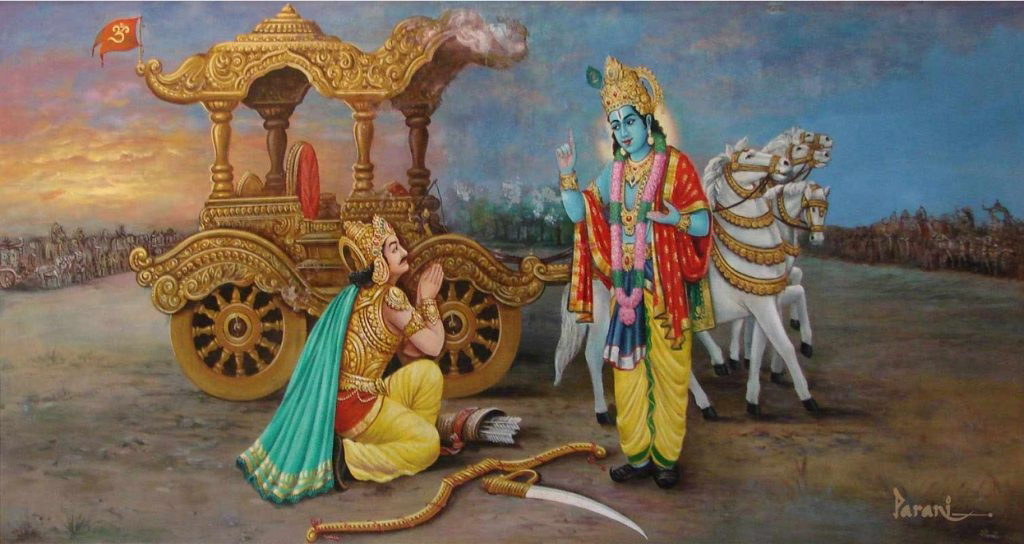The Bhagavad Gita | Chapter 5 : The Yoga of Renunciation |
अथ पञ्चमोஉध्यायः ।
अर्जुन उवाच ।
संन्यासं कर्मणां कृष्ण पुनर्योगं च शंससि ।
यच्छ्रेय एतयोरेकं तन्मे ब्रूहि सुनिश्चितम् ॥ 1 ॥
श्रीभगवानुवाच ।
संन्यासः कर्मयोगश्च निःश्रेयसकरावुभौ ।
तयोस्तु कर्मसंन्यासात्कर्मयोगो विशिष्यते ॥ 2 ॥
ज्ञेयः स नित्यसंन्यासी यो न द्वेष्टि न काङ्क्षति ।
निर्द्वन्द्वो हि महाबाहो सुखं बन्धात्प्रमुच्यते ॥ 3 ॥
साङ्ख्ययोगौ पृथग्बालाः प्रवदन्ति न पण्डिताः ।
एकमप्यास्थितः सम्यगुभयोर्विन्दते फलम् ॥ 4 ॥
यत्साङ्ख्यैः प्राप्यते स्थानं तद्योगैरपि गम्यते ।
एकं साङ्ख्यं च योगं च यः पश्यति स पश्यति ॥ 5 ॥
संन्यासस्तु महाबाहो दुःखमाप्तुमयोगतः ।
योगयुक्तो मुनिर्ब्रह्म नचिरेणाधिगच्छति ॥ 6 ॥
योगयुक्तो विशुद्धात्मा विजितात्मा जितेन्द्रियः ।
सर्वभूतात्मभूतात्मा कुर्वन्नपि न लिप्यते ॥ 7 ॥
नैव किञ्चित्करोमीति युक्तो मन्येत तत्त्ववित् ।
पश्यञ्शृण्वन्स्पृशञ्जिघ्रन्नश्नन्गच्छन्स्वपञ्श्वसन् ॥ 8 ॥
प्रलपन्विसृजन्गृह्णन्नुन्मिषन्निमिषन्नपि ।
इन्द्रियाणीन्द्रियार्थेषु वर्तन्त इति धारयन् ॥ 9 ॥
ब्रह्मण्याधाय कर्माणि सङ्गं त्यक्त्वा करोति यः ।
लिप्यते न स पापेन पद्मपत्रमिवाम्भसा ॥ 10 ॥
कायेन मनसा बुद्ध्या केवलैरिन्द्रियैरपि ।
योगिनः कर्म कुर्वन्ति सङ्गं त्यक्त्वात्मशुद्धये ॥ 11 ॥
युक्तः कर्मफलं त्यक्त्वा शान्तिमाप्नोति नैष्ठिकीम् ।
अयुक्तः कामकारेण फले सक्तो निबध्यते ॥ 12 ॥
सर्वकर्माणि मनसा संन्यस्यास्ते सुखं वशी ।
नवद्वारे पुरे देही नैव कुर्वन्न कारयन् ॥ 13 ॥
न कर्तृत्वं न कर्माणि लोकस्य सृजति प्रभुः ।
न कर्मफलसंयोगं स्वभावस्तु प्रवर्तते ॥ 14 ॥
नादत्ते कस्यचित्पापं न चैव सुकृतं विभुः ।
अज्ञानेनावृतं ज्ञानं तेन मुह्यन्ति जन्तवः ॥ 15 ॥
ज्ञानेन तु तदज्ञानं येषां नाशितमात्मनः ।
तेषामादित्यवज्ज्ञानं प्रकाशयति तत्परम् ॥ 16 ॥
तद्बुद्धयस्तदात्मानस्तन्निष्ठास्तत्परायणाः ।
गच्छन्त्यपुनरावृत्तिं ज्ञाननिर्धूतकल्मषाः ॥ 17 ॥
विद्याविनयसम्पन्ने ब्राह्मणे गवि हस्तिनि ।
शुनि चैव श्वपाके च पण्डिताः समदर्शिनः ॥ 18 ॥
इहैव तैर्जितः सर्गो येषां साम्ये स्थितं मनः ।
निर्दोषं हि समं ब्रह्म तस्माद्ब्रह्मणि ते स्थिताः ॥ 19 ॥
न प्रहृष्येत्प्रियं प्राप्य नोद्विजेत्प्राप्य चाप्रियम् ।
स्थिरबुद्धिरसंमूढो ब्रह्मविद्ब्रह्मणि स्थितः ॥ 20 ॥
बाह्यस्पर्शेष्वसक्तात्मा विन्दत्यात्मनि यत्सुखम् ।
स ब्रह्मयोगयुक्तात्मा सुखमक्षयमश्नुते ॥ 21 ॥
ये हि संस्पर्शजा भोगा दुःखयोनय एव ते ।
आद्यन्तवन्तः कौन्तेय न तेषु रमते बुधः ॥ 22 ॥
शक्नोतीहैव यः सोढुं प्राक्शरीरविमोक्षणात् ।
कामक्रोधोद्भवं वेगं स युक्तः स सुखी नरः ॥ 23 ॥
योஉन्तःसुखोஉन्तरारामस्तथान्तर्ज्योतिरेव यः ।
स योगी ब्रह्मनिर्वाणं ब्रह्मभूतोஉधिगच्छति ॥ 24 ॥
लभन्ते ब्रह्मनिर्वाणमृषयः क्षीणकल्मषाः ।
छिन्नद्वैधा यतात्मानः सर्वभूतहिते रताः ॥ 25 ॥
कामक्रोधवियुक्तानां यतीनां यतचेतसाम् ।
अभितो ब्रह्मनिर्वाणं वर्तते विदितात्मनाम् ॥ 26 ॥
स्पर्शान्कृत्वा बहिर्बाह्यांश्चक्षुश्चैवान्तरे भ्रुवोः ।
प्राणापानौ समौ कृत्वा नासाभ्यन्तरचारिणौ ॥ 27 ॥
यतेन्द्रियमनोबुद्धिर्मुनिर्मोक्षपरायणः ।
विगतेच्छाभयक्रोधो यः सदा मुक्त एव सः ॥ 28 ॥
भोक्तारं यज्ञतपसां सर्वलोकमहेश्वरम् ।
सुहृदं सर्वभूतानां ज्ञात्वा मां शान्तिमृच्छति ॥ 29 ॥
ॐ तत्सदिति श्रीमद्भगवद्गीतासूपनिषत्सु ब्रह्मविद्यायां योगशास्त्रे श्रीकृष्णार्जुनसंवादे
कर्मसंन्यासयोगो नाम पञ्चमोஉध्यायः ॥5 ॥
Arjuna asks Krishna whether the path of renunciation or the path of action is better for him. Krishna replies that both paths are good but that the path of karma yoga is more direct. The path of renunciation and the path of action both lead to the Self if practiced deeply. Both the wise sage and the doer of karma yoga practice action, whether it be action in battle or action of the mind in studying scriptures, without attachment to the results. Ignorance of the Self is what causes men to "act badly." Krishna insists that "wise men regard all beings / as equal," understanding that the Self at the core of all beings is the same, only clothed in different bodies.
Analysis
This chapter mixes the concepts of renunciation, or sannyasa, with the previously discussed idea of the knowledge-yoga path. Because both ideas are used relatively interchangeably here, it can be assumed the path of renunciation is also the path of Sankhya yoga, or the yoga of wisdom and knowledge. Krishna posits that both are legitimate paths to the truth and the true Self. In devoting oneself to one of these paths, one can ultimately achieve both. The practices of meditating, renouncing worldly pleasures, and studying the scriptures are actions that lead to the wisdom of understanding the true Self and to liberation from suffering. The path of karma yoga also leads to the same wisdom. Krishna explains that in this way, the two paths lead to the same place and involve both action and gaining understanding. The difference is that some people are led by their circumstances of birth to seek the Self primarily through renunciation or knowledge, and some, like Arjuna, are meant to seek it through the yoga of action.
Application in human affairs
In our daily lives, the teachings from Chapter 5 of the Bhagavad Gita can guide us towards a balanced and purposeful existence. Embracing the essence of karma yoga, we can approach our actions with a sense of detachment from the outcomes. This means dedicating ourselves wholeheartedly to our responsibilities, whether in our profession, relationships, or personal pursuits, while letting go of excessive attachment to success or failure.
The idea of regarding all beings as equal encourages us to cultivate empathy and understanding, fostering harmonious relationships in our social interactions. By recognizing the common essence within every individual, we can transcend superficial differences and practice compassion.
Furthermore, integrating elements of renunciation into our lives doesn't necessarily mean complete withdrawal from the world but rather letting go of the ego-driven attachments and desires that often lead to suffering. Whether through moments of reflection, meditation, or a commitment to continuous learning, we can strive for self-awareness and inner peace.
In essence, the teachings encourage a holistic approach to life, where we navigate our worldly duties with a spirit of selflessness, maintain equanimity in the face of challenges, and actively seek understanding of the higher truths that connect us all. By incorporating these principles, we can lead a life that is both purposeful and spiritually enriching.
कृष्णम् वन्दे जगद्गुरुम्🙏



Comments
Post a Comment